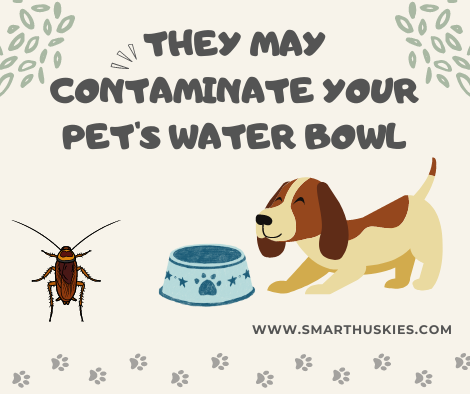The cockroaches that we typically encounter in our homes are not harmful to dogs. However, there is a species of cockroach that can be harmful to dogs, and that is the American cockroach.
This type of cockroach can carry bacteria that can cause disease in dogs. While most cockroaches are not harmful to dogs, it is best to keep your dog away from them, just to be safe. Also, if you have a cockroach problem in your home, be sure to call a pest control professional to get rid of them.
Table of Contents
Did you know?
Cockroaches are not just found in dirty homes – they can be found in clean homes, too! They like to eat many things, including human food, pet food, and even garbage. Cockroaches can also spread disease by contaminating food with their saliva or feces.
If you see a cockroach in your home, it is best to call a pest control professional to get rid of them.
How can I keep cockroaches away from my dog?
There are a few things you can do to help keep cockroaches away from your dog:
-Keep your home clean and free of food debris. Cockroaches are attracted to food, so keeping your home clean will help deter them.
-Store food in sealed containers and dispose of garbage regularly.
-Call a pest control professional if you have a cockroach problem.
-Keep your dog away from areas where cockroaches are present.
That said, here are 10 ways cockroaches can affect your pet, according to experts.
1. They Can Carry Diseases
While most cockroaches won’t harm your pet, some can carry disease-causing bacteria like Salmonella enterica and E. coli O157:H7, which can make your dog or cat sick. In fact, a study published in the Journal of Medical Entomology found that American cockroaches (Periplaneta Americana) were carriers of at least 33 different kinds of bacteria, six kinds of parasitic worms, and more than seven other types of human pathogens.
2. They Can Trigger Allergies
Cockroaches are known to trigger allergies in both humans and pets. If your dog or cat is allergic to cockroaches, they may experience symptoms like sneezing, coughing, wheezing, and difficulty breathing. In severe cases, anaphylactic shock can occur.
3. They Can Give Your Pet Gastrointestinal Issues
If your pet ingests a cockroach, they may experience gastrointestinal issues like vomiting and diarrhea. In some cases, the cockroach may even cause an obstruction in your pet’s intestines.
4. They Can Cause Skin Irritation
Cockroaches can also cause skin irritation in both humans and animals. If your pet comes into contact with a cockroach, they may develop a rash or other skin reaction.
5. They May Eat Your Pet’s Food
Cockroaches are known to eat just about anything, including your pet’s food. If you have a cockroach problem in your home, be sure to keep your pet’s food in sealed containers and dispose of any garbage regularly.
6. They May Contaminate Your Pet’s Water Bowl

If you have a cockroach problem in your home, there’s a chance that your pet’s water bowl could become contaminated with bacteria or other toxins. As a result, your pet could become sick if they drink from their bowl.
7. They Can Trigger Asthma Attacks
If you or your pet is allergic to cockroaches, exposure to them can trigger asthma attacks. In severe cases, hospitalization may be required.
8. They Can Spread parasites
Cockroaches can also spread parasites like fleas, ticks, and mites. If your pet comes into contact with a cockroach that is carrying these parasites, they could become infested.
9. They May Bite Your Pet
While most cockroaches don’t bite, some species may nibble on your pet’s skin if they’re feeling threatened. This can cause irritation and even lead to an infection.
10. They Can Make Your Home Smell Bad
If you have a cockroach problem in your home, it’s likely that your house will start to smell bad. Cockroaches produce an unpleasant odor that can be hard to get rid of.
If you think your pet may have come into contact with a cockroach, it’s important to watch for any signs of illness or irritation. If you notice anything out of the ordinary, be sure to take them to the vet right away.
We hope you found this information helpful. If you have any further questions or concerns, please feel free to contact us.







